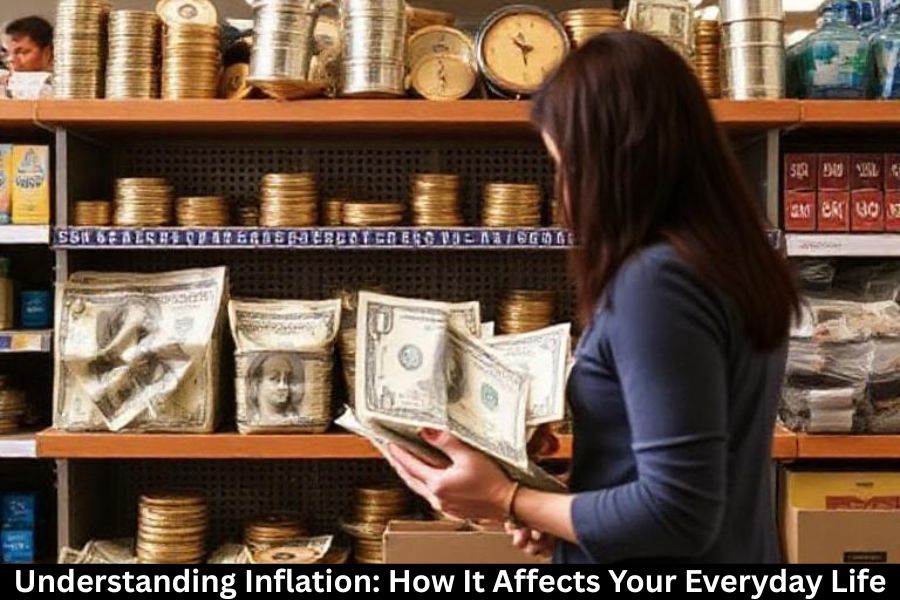Have you ever noticed that your favorite snack or coffee costs more than it did a few years ago? That’s inflation at work. It’s a term we hear on the news all the time — but what does it really mean, and how does it affect you?
Inflation isn’t just an abstract economic concept. It touches your wallet, job, and future savings. Understanding it helps you make smarter financial decisions and prepare for the rising cost of living.
The Basics of Inflation
What Is Inflation?
Inflation is the rate at which the general level of prices for goods and services rises over time. In simple terms, it means your money buys less than it used to.
How Inflation Is Measured
Economists measure inflation using tools like the Consumer Price Index (CPI), which tracks price changes for everyday items like food, rent, and transportation.
The Role of Supply and Demand
When demand for goods exceeds supply, prices rise. Similarly, when production costs increase, companies charge more — both driving inflation.
Causes of Inflation
Demand-Pull Inflation
This happens when demand outpaces supply. For example, if everyone wants new cars but there aren’t enough available, prices go up.
Cost-Push Inflation
When production becomes more expensive — due to higher wages or material costs — companies pass those increases to consumers.
Built-In Inflation
As prices rise, workers demand higher wages to maintain their standard of living. Employers raise prices to cover those wages — creating a cycle.
How Inflation Impacts Your Purchasing Power
Inflation slowly erodes your purchasing power. That $100 you saved five years ago can no longer buy the same amount of goods today.
Example:
If inflation averages 3% per year, something that costs $100 now will cost about $116 in five years — even if your income stays the same.
The Role of Central Banks and Government Policies
How the Federal Reserve Controls Inflation
The Federal Reserve (Fed) uses tools like interest rates and money supply to manage inflation. When inflation rises too fast, the Fed increases rates to slow spending.
Interest Rates and Their Impact
Higher interest rates make borrowing more expensive — reducing demand for goods, which helps stabilize prices.
Inflation and Your Savings
How Inflation Erodes Savings
If your savings earn 2% interest but inflation is 4%, you’re effectively losing money because your purchasing power decreases.
Ways to Protect Your Money
- Invest in assets that grow faster than inflation (like stocks or real estate).
- Use high-yield savings accounts or Treasury Inflation-Protected Securities (TIPS).
Inflation and Wages
Inflation affects salaries, too. When prices rise faster than paychecks, people can afford less — even if they’re earning more in numbers.
This leads to the wage-price spiral, where rising wages lead to higher prices, which then fuel further wage demands.
Inflation and Debt
Here’s a surprising fact — inflation isn’t always bad for everyone.
Borrowers benefit when inflation rises because they repay loans with cheaper dollars. However, lenders and fixed-income earners lose because their returns don’t keep pace with inflation.
The Cost of Living: Everyday Effects of Inflation
You feel inflation every time you:
- Fill your gas tank
- Pay rent or buy groceries
- Dine at a restaurant
Even small price increases accumulate, creating what economists call the “invisible tax” — your paycheck stays the same, but everything else costs more.
How Inflation Affects Businesses
Businesses face rising costs for materials, labor, and transport. Some raise prices to maintain profits, while others cut costs — often by reducing staff or quality.
Companies that manage inflation well adapt through innovation, efficiency, or diversification.
Global Inflation: How One Country’s Prices Affect Another
In a global economy, inflation doesn’t stop at borders. When oil prices rise globally or supply chains slow down, countries around the world feel the effects.
For instance, a shortage of microchips in Asia can make electronics more expensive in the United States.
Good vs. Bad Inflation
When Moderate Inflation Is Healthy
A little inflation (around 2% annually) indicates a growing economy. It encourages spending and investment — people buy now instead of waiting for lower prices.
The Dangers of Hyperinflation and Deflation
- Hyperinflation: Prices skyrocket uncontrollably (like in Venezuela or Zimbabwe).
- Deflation: Prices drop and people stop spending, leading to economic stagnation.
Both extremes are harmful — balance is key.
How to Protect Yourself from Inflation
You can’t stop inflation, but you can outsmart it.
Smart Investing
- Invest in stocks, bonds, or real estate — assets that grow faster than inflation.
- Diversify your portfolio to reduce risk.
Adjust Spending Habits
- Buy in bulk before price hikes
- Cut unnecessary subscriptions
- Compare prices and use cashback apps
Diversify Income Sources
Consider side hustles, freelancing, or passive income streams to keep your earnings ahead of inflation.
Inflation and the Future
Technology and automation may reshape how inflation behaves.
For instance, online shopping and AI-driven logistics can reduce production costs — potentially keeping prices stable.
However, global challenges like climate change, resource shortages, and political instability may continue to push prices upward.
Conclusion
Inflation isn’t something you can control — but understanding it gives you power.
By learning how it works and how to protect yourself, you can adapt, invest wisely, and maintain financial security even as prices rise.
Remember: knowledge is your best defense against the hidden tax of inflation.
FAQs
1. What causes inflation?
Inflation is caused by rising demand, increased production costs, or expansion of the money supply.
2. How does inflation affect savings?
Inflation reduces your money’s purchasing power, so savings lose value over time if not invested wisely.
3. Is inflation always bad?
Not necessarily. Moderate inflation is healthy — it promotes spending and investment.
4. How can I protect my finances from inflation?
Invest in assets that grow faster than inflation, cut unnecessary costs, and diversify income.
5. What happens if inflation gets too high?
High inflation reduces purchasing power, increases living costs, and can destabilize the economy if not controlled.



